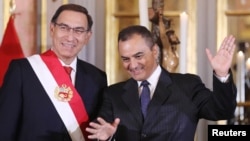Peruvian President Martin Vizcarra on Thursday swore in the country's fifth finance minister in the past year, tasking him with deciding whether to keep higher excise taxes on diesel and other fuels that have sparked protests.
Carlos Oliva, a former deputy finance minister and central bank official, will also be in charge of helping to spearhead Vizcarra's recent promise to recover unpaid corporate taxes.
On Monday, following scattered protests in southern Peru over the new excise tax rates, Vizcarra announced he had accepted the resignation of former Finance Minister David Tuesta and promised his government would focus on enforcing existing tax laws as opposed to raising taxes.
Tuesta stepped down after Vizcarra's government negotiated a deal with truck and bus drivers that averted a larger protest against the higher excise tax rates.
Oliva will manage one of Latin America's most stable economies following months of political uncertainty that led former President Pedro Pablo Kuczynski to resign in a corruption scandal in March.
Vizcarra, the country's former vice president, has sought to distance himself from his disgraced predecessor while seeking support in the opposition-run Congress and among Peruvians disenchanted with politics.
Protests in Lima
Earlier this week, protests in Lima against Congress and the government's decision to raise excise tax rates ended in clashes and with a police car burned.
Oliva, who received a master's degree in economics from Georgetown University in Washington, is widely expected to maintain Peru's decades-old free-market economic model.
Oliva was a deputy finance minister during the government of former President Ollanta Humala and was the director of the public administration master's program at Lima's Pacific University before his appointment on Thursday.





